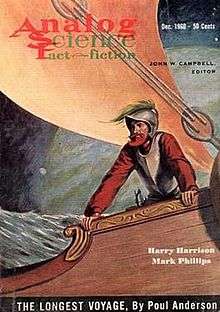The Longest Voyage
"The Longest Voyage" is a science fiction short story by American writer Poul Anderson. It won the Hugo Award for Best Short Story in 1961.
| "The Longest Voyage" | |
|---|---|
 | |
| Author | Poul Anderson |
| Genre(s) | Science fiction |
| Publisher | Analog Science Fiction and Fact |
| Publication date | 1960 |
Plot summary
On a distant world the age of exploration is beginning. A party of daring explorers attempts to circumnavigate their world. In unknown waters they encounter an island civilization which claims to have a prophet who fell from the stars.
Reception
"The Longest Voyage" won the 1961 Hugo Award for Best Short Story.[1]
Jean-Daniel Brèque has described "The Longest Voyage" as "a rousing adventure yarn", "solidly plotted, like a well-oiled mechanism", and "also a work of poetry".[2]
Gardner Dozois, upon selecting "The Longest Voyage" for inclusion in his 2000 anthology Explorers: SF Adventures to Far Horizons, said that it is "nearly unmatched" in science fiction for its "lyricism, compassion, subtlety, thoughtfulness, and above all the relish it takes in the bristling strangeness and wonder of the world".[3]
Steven H. Silver commented that what distinguishes "The Longest Voyage" from similar stories is that "Anderson provides strong motivation for both the explorers and the natives".[4]
References
- 1961 Hugo Awards, at TheHugoAwards.org; retrieved January 6, 2017
- News from France: A Man Who Counts, by Jean-Daniel Brèque; at DanSimmons.com; published 2008; retrieved May 30, 2015
- Introduction to 'The Longest Voyage', in Explorers: SF Adventures to Far Horizons, by Gardner Dozois, published 2000 by MacMillan
- THE HUGO WINNERS, VOLUME I - Edited by Isaac Asimov, reviewed by Steven H. Silver, on the SF Site; published no later than March 7, 2004 (earliest version on archive.org); retrieved May 30, 2015